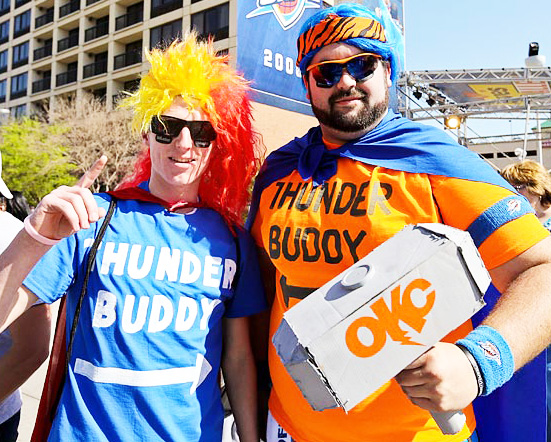Psychology prof explains grief, PTSD differences


When the Oklahoma City Thunder basketball team lost in the NBA Western Conference semifinals, many fans in the state of Oklahoma were a little upset. Some thought people were so upset that they should be diagnosed with Post Traumatic Stress Disorder (PTSD).
Charlotte Lankard, a weekly columnist for The Oklahoman, published a column talking about fans being diagnosed with PTSD — Post Thunder Stress Disorder.
Lankard has different ways describing this diagnosis, including “Post Thunder Sleep Deprivation,” “Pre-Thunder Stress Disorder,” “Chronic Thunder Obsessive Disorder” and “Post-Thunder Depression.”
“Thunder pathology can vary and increase from year to year and is especially severe during late spring,” Lankard said.
Although Lankard thinks this could be an issue, Sheri Jewell-Fleming, an OCCC adjunct psychology professor, disagrees.
“It’s funny because it seems like a cross between more of addictive behavior and the stress that comes from the object of your obsession not following through with your expectations,” Fleming said.
“I could see how PTSD could be something linked to it because they’re called fans for a reason,” she said.
“‘Fan coming from the root word fanatic — which means ‘strangely obsessed with.’” Fleming did not think Lankard was truly meaning people were being diagnosed with PTSD. She said Lankard’s column was intended to be more tongue-in-cheek. Fleming said she doesn’t disagree that it could lead to sleepless nights, anxiety or nightmares — but that it is not severe enough to be PTSD.
She said true PTSD is always connected to a major trauma and she does not see that with this sporting event.
“This seems more like a grief process than a PTSD process.”
Fleming said, originally, PTSD was grouped with anxiety but has since been moved to its own category.
“PTSD was originally coined a shell shock condition found in veterans from war,” Fleming said.
Even though Fleming does think this is a little “watered down to be in this situation” she wants to make sure that she does not “water down the disorder or the severity of what it means, just to say that it would apply simply to people who are fans of a sporting event.”
To help understand the difference between PTSD and more of an anxiety or grief issue, Fleming explained: “If we’re talking sporting events, grief would be connected to the loss, and PTSD would be connected to say someone showed up and shot a player because they didn’t win. Then the fans, the players, and who ever was watching could have issues of dealing with PTSD.”
Fleming made her final opinion saying it was more a “battle of true mental health or a grief process.”
Lankard finishes her column by saying she is “considering putting together a support group for fellow sufferers next season.”
To contact Fleming, email sheri.h.jewell-roy@occc.edu. For additional information regarding PTSD, visit www.mayoclinic.org/diseases-conditions/post-traumatic-stress-disorder/basics/definition/con-20022540.